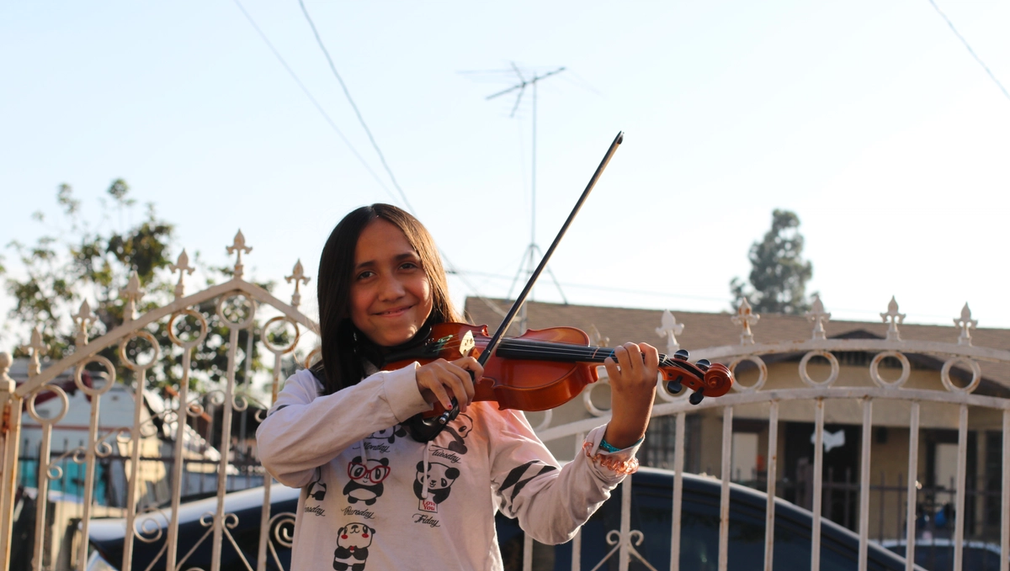Social Justice Through Music Production
From Billie Holiday’s harrowing classic “Strange Fruit” to Sam Cooke’s athemic ballad “A Change Is Gonna Come”, artists have utilized music as a vehicle for individual growth and social transformation. At Harmony Project we’ve continued this proud tradition by empowering the vibrant voices of children and youth through music education programming that channels their boundless creativity to help forge a better future for themselves and their peers.

What is the primary issue area that your application will impact?
K-12 STEAM Education
In which areas of Los Angeles will you be directly working?
Central LA
East LA
San Gabriel Valley
South LA
South Bay
In what stage of innovation is this project, program, or initiative?
Expand existing project, program, or initiative
What is your understanding of the issue that you are seeking to address?
From the selected musical repertoire to the music educators themselves, white culture permeates every aspect of the music learning experience, which consistently plays a part in limiting participation from BIPOC students. In 2011, researchers Carlos Abril and Kenneth Elpus discovered that 66% of music ensemble students were white and middle class. Similarly, Elpus found that 86% of music teachers entering the profession were also white and middle class. There is a significant lack of diversity across the spectrum of music, including at the educational and professional levels. According to a survey of industry professionals, 83% reported that a majority of their company’s leadership positions were held by white people. Similarly, a study conducted by the Martin Prosperity Institute revealed that 73.8% of all creative class jobs nationwide are held by white workers. This lack of representation places students from communities of color at a competitive disadvantage to their white peers.
Describe the project, program, or initiative this grant will support to address the issue.
Our Social Justice Through Music Production program is a 13-week intensive course that invites more than 400 students (ages 9 through 18) from all of our partnering sites to work collectively towards the common goal of recording and producing an album. Participating students will receive lessons, guidance, and supervision from various teaching artists with expertise in songwriting/composing, spoken word/hip-hop, recording, performing, mixing, and contemporary music history. Students will learn about every stage of the music production process and create a song that explores self-identity/social issues. All of the songs will be combined into a final session album that will be released both as a physical CD and on digital platforms such as SoundCloud. The class will also collaboratively create album artwork, develop a marketing strategy, and establish a release timeline. The production and performance processes covered in this course will intersect with lessons in math, science, and social-emotional learning as well as include the following social justice elements: - Deconstructing and subverting gender roles/expectations in the studio; - Democratizing access to music production technology; - Demystifying music production and music business processes; - Nurture a collaborative and supportive environment for student-led creativity. - Utilize non-punitive classroom management techniques rooted in restorative and transformative justice.
Describe how Los Angeles County will be different if your work is successful.
Harmony Project envisions a future where every child and youth in Los Angeles County, regardless of their ethnicity, race, and/or socioeconomic standing, has access to an engaging and supportive musical ecosystem that celebrates their creativity and individuality, uplifts their unique voices, and serves as a second home they can depend on during times of need. While music education will always remain our primary focus, we know from internal data that our impact extends beyond teaching students how to play a musical instrument. “Music has kept me sane. It helps me express myself, it also helps me with my emotional intelligence. I feel free, calm, and like myself in music. It's something I enjoy getting lost in and it helps me with my depression and anxiety. When I play music, it feels like I'm on another planet by myself where the only things that matter are me and my music,” one of our students wrote.
What evidence do you have that this project, program, or initiative is or will be successful, and how will you define and measure success?
Goal #1 - Inspire participants to express themselves creatively in a healthy and productive manner. Outcome #1 - Our Social Justice Through Music Production program will achieve an 80% attendance rate. Goal #2 - Encourage participants to think critically about the world and their place in it. Outcome #2 - 80% of participants will report an increased awareness about social issues that impact them. Goal #3 - Enhance participants' sense of belonging and connection to their communities. Outcome #3 - 80% of participants will report an increased feeling of connectedness to their peers. Goal #4 - Develop participants’ self-confidence and a sense of their own power and importance. Outcome #4 - 80% of participants will report an increase in self-confidence. Goal #5 - Provide pre-professional training for youth in the fields of audio engineering and music production. Outcome #5 - 90% of participants will report an increased understanding of audio engineering and music production.
Approximately how many people will be impacted by this project, program, or initiative?
Direct Impact: 400
Indirect Impact: 3,000
Describe the specific role of the partner organization(s) in the project, program, or initiative.
Not Applicable